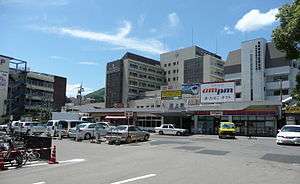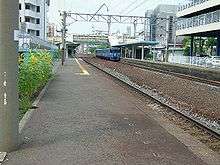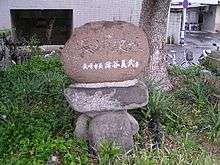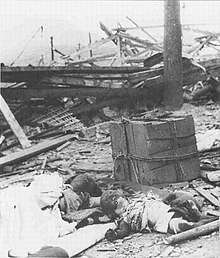Urakami Station
Urakami Station (浦上駅, Urakami-eki) is a railway station in Kawaguchi-chō, Nagasaki, Nagasaki Prefecture, Japan. It is operated by JR Kyushu and is on the Nagasaki Main Line. It is the station where the old line and new line sections of the Nagasaki Line intersect. In front of the station is the Urakami Ekimae stop on the Nagasaki Electric Tramway.
Urakami Station 浦上駅 | |
|---|---|
 | |
| Location | Kawaguchi-machi, Nagasaki, Nagasaki (長崎県長崎市川口町) Japan |
| Operated by | JR Kyushu |
| Line(s) | Nagasaki Main Line |
| History | |
| Opened | 1897 |
| Previous names | Nagasaki (until 1905) |
| Traffic | |
| Passengers (2005) | 3,801 daily |

Layout
The current station building was built after the previous one was burnt down by the atomic bombing. There is one automatic ticket machine, but no automatic turnstile. Urakami Station has two island platforms facing each other, servicing two tracks. There is an overhead walkway connecting the two platforms.
| 1 | ■Limited Express Kamome ■Express Seaside Liner ■Nagasaki Main Line |
To Nagasaki |
|---|---|---|
| 2 | ■Limited Express Kamome | To Isahaya・Saga・Hakata |
| ■Express Seaside Liner | To Isahaya・Ōmura・Huis ten Bosch・Sasebo | |
| ■Nagasaki Main Line(via Ichinuno) | To Isahaya・Yue・Hizen-Yamaguchi・Tosu | |
| ■Nagasaki Main Line(via Nagayo)・Ōmura Line | To Isahaya・Ōmura・Huis ten Bosch・Sasebo |
Environs
In front of the station is the Urakami Ekimae stop of the Nagasaki Electric Tramway. Behind the station is a hospital, and nearby are condos, concert halls, broadcast stations and schools among other things. Many of the people who use this station are commuters to these places.
Educational facilities
- Kassui High School and Junior High School
- Nagasaki Nishi High School
- Fuchi Junior High School
- Zenza Elementary School
- Sakamoto Elementary School
- Kitakyushu Preparatory School
- Nagasaki University School of Medicine
- Nagasaki University School of Dentistry
Medical care
- Nagasaki University Hospital of Medicine and Dentistry
- Japanese Red Cross Nagasaki Atomic Bomb Hospital
- Nagasaki Prefecture Medical Association Hall
Cultural facilities
- Nagasaki National Peace Memorial Hall for the Atomic Bomb Victims
- Nagasaki Atomic Bomb Museum
- Nagasaki City Peace Hall
- Nagasaki City Museum of History and Folklore
- Nagasaki Brick Hall
Media
- Nagasaki Shimbun
- Nagasaki Cultural Telecasting Corporation
Usage
On average 3,801 people use this station per day (2005 estimate).
History


_(cropped).jpg)
When this station first opened on July 22, 1897, it was called Nagasaki Station. Even today there is a stone monument in one corner of the station plaza which reads "The Site of Nagasaki Station" (「長崎駅址」). On August 9, 1945 the station was destroyed by the nuclear bomb dropped on Nagasaki.
- 1897-07-22 - Opens for business as Nagasaki Station, the terminal station of the Nagasaki Line of Kyushu Railways.
- 1905-04-05 - The line extends and the station is renamed to Urakami Station.
- 1907-07-01 - The station becomes nationally run according to the nationalization of Kyushu Railways.
- 1909-10-12 - Japanese National Railways renames the line the Nagasaki Main Line (長崎本線).
- 1945-08-09 - Damaged by the atomic bombing.
- 1972-10-02 - The "new line" section of the Nagasaki Main Line opens and Urakami Station becomes a junction for the new and old sections of the line.
- 1976-06-06 - The track between Tosu Station and Nagasaki Station (Nagasaki) becomes electrified.
- 1987-04-01 - Japanese National Railways privatizes and JR Kyushu becomes the station's operator.
Adjacent stations
| Wikimedia Commons has media related to Urakami Station. |
| ← | Service | → | ||
|---|---|---|---|---|
| Isahaya | Nagasaki Main Line (Limited Express Kamome) | Nagasaki | ||
| Kikitsu | Nagasaki Main Line (Rapid Seaside Liner※) | Nagasaki | ||
| Utsutsugawa | Nagasaki Main Line ("new line" local service) | Nagasaki | ||
| Nishi-Urakami | Nagasaki Main Line ("old line" local service) | Nagasaki |
※Some trains are different in a station to stop.